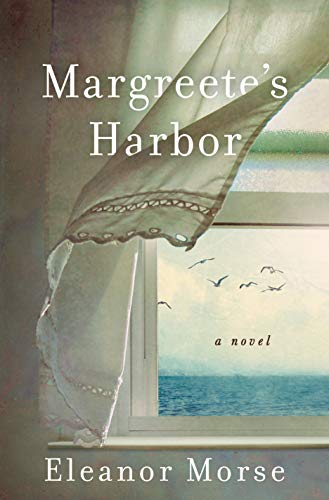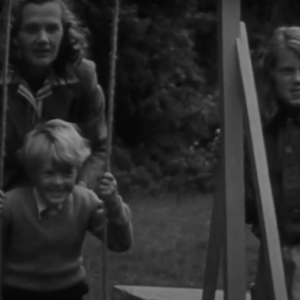
They were a herd of locusts. Worse. An occupying army. The girl cried. She was scared at night. She was a silly little thing. And the two children fought by day, slammed doors, thundered through the house. It appeared to be more than a visit. A moving van came with boxes. And more boxes. The bedrooms were full. This wasn’t her idea. When you’re old, you need quiet; you need the shadows of the day to fall over you softly.
The wild geese had returned and settled down by the harbor. Margreete heard them after dark through her open bedroom window. Their voices were urgent, the way the world began. They honked across the sky, barking like flying dogs. They brought tears to her eyes, remembering her mother’s tears when the geese would return in the spring.
What remained in her, Margreete, were memories that no one cared about, except her and maybe the boy who was living here now, with the large, dark eyes. Her daughter’s boy—at least that’s who Liddie said he was. He asked her questions and she told him. “I was born in Saskatchewan. And my mother was born there. And my father, Pearl Crowe, was born there, too. Saskatchewan is in Canada, a long way from here.”
“Pearl is a girl’s name,” the boy with the dark eyes said.
“I ought to know the name of my own father,” she said. “That was his name. Men were named Pearl in those days. Hush, now. After my parents married, my father couldn’t find work. They had baby Margreete—me—and they moved to the United States, to Upstate New York, where winters were dark and you could smell the cold coming over the Adirondacks. My mother said it was a pure smell, like a mountain spring. My father worked in the woods, and my mother worked at home, and when her work was done, she walked to the lending library with me and brought back armloads of the great classics in a rucksack. She read Shakespeare to me; she expected great things, but there was no money for great things. When I was seven years old, my parents moved to Bath, Maine, where my father found a job working as a sternman on a lobster boat. He built most of this house with his own two hands and with the help of his brother, who lived with us for a time. It was no bigger than a shed when we moved here.”
“Why did you burn down the kitchen?” “Did you think I meant to do that?” “So we’d have to move here.”
“You thought I wanted that?”
“Because you were all by yourself and you were losing your brains.”
“I like being by myself.”
“And do you like being not all by yourself now?” “No.”
They were sitting in the living room, Bernie on the round piano stool with the wrought-iron legs, and she next to him. He twirled around on the stool, and the stool did a heavy little gallop.
“Do you want us to go away?”
“Why? Do you want to go back home?” she asked.
“We can’t. We sold the house. Some other people are living there now.” He looked at her. “Why are your teeth all scraggly, like a witch?”
“I used to like to chew ice, but I don’t do it anymore. It got expensive. Let me give you a piece of advice. Never start the habit. It’s a hard one to break. Worse than a smoking habit. Don’t ever start that, either.”
“So they broke, just like that?”
“Just like that. Crack. Crunch.” “Did you ever have a husband?”
“Three of them. The first one died. He fell off a tall building, although some people say he jumped. I’ll never know. The second one was Mr. Irving Bright. Irving grew up in the Bronx. Do you know where that is?”
“It’s in New York.” “You’re a smart boy.” “Yes, I am.”
“Irving was a smart boy, too, but he was very impractical, growing up in New York. He knew nothing about cars. He didn’t even know how to drive when I first met him. I had to drive him everywhere. I did the tune-ups and oil changes, and when winter set in, I lay flat on the frozen ground in the shed out there with my head beside the tire of the car and wrestled the chains onto the bald tires so the car could climb the hill to the main road. Traction is a very important thing.” She said it again, for emphasis.
“What’s traction? Like a tractor?”
“Don’t interrupt, I’m telling you something. I was good behind a wheel. Irving was lousy with cars, but he was a fine man anyway, and we loved each other.”
“Where is he now?”
“Under the ground. He was seventeen years older than me. He worked in a shoe factory. Then he was a day laborer. The work took a lot out of him. He was a handsome man. An amorous man. I’m not telling you what that means.”
“I know what it means.” “What does it mean?” “I don’t know.”
“Irving was a good father. Liddie was fifteen when he died, Peter was thirteen, and Willard was eleven years old.”
“My mother Liddie?”
“Are you Liddie’s boy?” She peered at him and went on. “I didn’t know what to do after Irving died, I was so sad.” She was quiet a moment. “I didn’t know what to do. When you kids were in school . . .”
“I wasn’t with you, Grandma. You’re talking about someone else.”
“When you kids were in school after your father died, I used to drive a long ways and come home before the bus dropped you off. Sometimes I didn’t make it home in time. One day I almost thought I wouldn’t come home at all. While I was driving, I sang songs that Irving and I used to sing together. ‘Pistol Packin’ Mama.’ ‘Some Enchanted Evening,’ you know that one?”
“No.”
“Some enchanted evening,” she sang. “You may see a stranger . . .” “You don’t know how to sing, do you, Grandma.”
“I used to sing just fine, but it’s the breath, boy. And I’m not your grandma. The breath gets thinner. Like mountain air. But that doesn’t matter. It’s the thought that counts. You mustn’t be afraid of sentimental, romantic things.”
Bernie did another couple of fast rotations on the piano stool. As it jumped toward the wall, he put his foot out to keep from hitting it and left a footprint in the middle of the lilac wallpaper. He put his hands on either side of the bench and made one slow twirl. “So that was two husbands.”
“Then there was Everett Hocking, who worked at the bank, and he said he’d like to marry me. And he did marry me, and Mrs. Bright became Mrs. Hocking. Mrs. Hocking had more money than Mrs. Bright, but if Mrs. Bright had been standing at the top of the stairs of happiness, she tumbled right down to the bottom with Mr. Hocking.”
“Where is Mr. Hocking? Did you get a divorce?”
“He died just in time. Shoveling snow. He must have had a heart condition. He looked strong with his big chest, but he wasn’t. He was a clumsy, rumbling man. An old goat. He cleared his throat a lot. As though he was about to say something important. But he never did. We had nine years together. He belched after dinner and pontificated. Do you know what pontificated means?”
“No.”
“He was boring, but he didn’t know how boring he was. Like a show-off.”
“I know some show-offs,” said Bernie. “Sometimes I’m a show-off.” “It’s hard to love a show-off. I couldn’t bear to look at Mr. Hocking after a couple of years. I asked Liddie what I should do and she told me to leave him, but I didn’t. But then he left me all of a sudden. Heart attack. My name is Mrs. Bright again. I didn’t feel bad about losing Mr. Hocking, but I felt bad for other reasons, and I said to Liddie that maybe I killed him by not loving him enough, and Liddie told me I was crazy. She said he was an impossible man to love and he just died, that was all.”
“If you don’t love someone enough, you can kill them?”
“Some people would say no, but I think you can. What do you think?”
“I think you can. But it doesn’t work that way with your sister, only someone you’re supposed to love.”
“You’re not supposed to love your sister?” “Not really.”
“Well, let me tell you one thing. When you grow up, don’t ever try to love someone you don’t love. And don’t ever try to not love someone you do love. Don’t ever forget that, you hear me?”
__________________________________
From Margreete’s Harbor by Eleanor Morse. Copyright © 2021 by the author and reprinted by permission of St. Martin’s Publishing Group.

